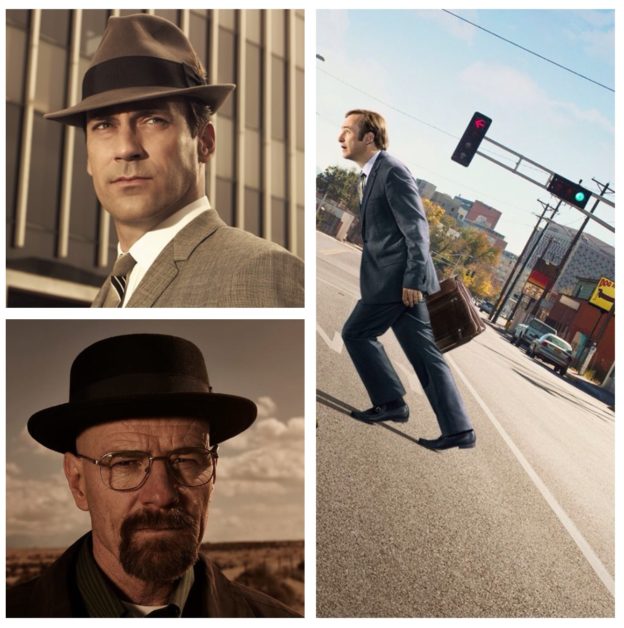
BGC
Don’t tell me how the story ends
The journey’s mine to choose.
That’s the beauty of what begins
You set what’s there to lose.


BGC
Don’t tell me how the story ends
The journey’s mine to choose.
That’s the beauty of what begins
You set what’s there to lose.
I met a traveller from an antique land,
Who said—“Two vast and trunkless legs of stone
Stand in the desert. . . . Near them, on the sand,
Half sunk a shattered visage lies, whose frown,
And wrinkled lip, and sneer of cold command,
Tell that its sculptor well those passions read
Which yet survive, stamped on these lifeless things,
The hand that mocked them, and the heart that fed;
And on the pedestal, these words appear:
My name is Ozymandias, King of Kings;
Look on my Works, ye Mighty, and despair!
Nothing beside remains. Round the decay
Of that colossal Wreck, boundless and bare
The lone and level sands stretch far away.”

Warning: Spoilers don’t about; they lurk)
As the unofficial Assistant to the Manager of the Vince Gilligan Fan Club, I have been watching Better Call Saul religiously — and by extension, reruns of my two favorite shows, Breaking Bad and Mad Men.
And it has reawakened an inner-torment, one that perhaps other rabid fans of BB/MM suffer: Which of the dark odysseys is the better drama? Matthew Wiener’s tale of Wall Street executives in the 1960’s, or Gilligan’s tale of a high school meth teacher gone horribly astray?
And in confession, I wax and wane. Some days, the nod to goes to Don Draper, the suave, womanizing alcoholic of Man Men. On others, Walter White reigns as ultimate anti-hero, the cancer-stricken anchor of Breaking Bad. One thing remains clear: For all the brilliance of Saul (and there is much), BCS is a shadow of both.
That’s not a criticism of Saul; even a shadow of Gilligan’s breakthrough show eclipses all other TV. But its shadow remains looming, given the intellect of both predecessors.
But recently, I came to a realization: Saul is actually an homage of both shows, which are fraternal twins.
Consider the core of Mad Men and Breaking Bad:
It’s that final point in which the shows chose particularly different (yet equally eloquent) paths to reach their finales.
Let’s start with Mad Men, which launched on AMC from 2007-20015 and tells the story of high-powered Wall Street executives through the 1960’s. Breaking Bad, meanwhile, aired from 2008-13 and tells of a high school teacher who employed a former student to cook and sell meth.
Purists will argue that Mad Men deserves more credit because it arrived first. But, in truth, abstract art must always follow representational art, lest it lack source material.
And that is the defining difference — and link — between the shows: Mad Men is representational art, Breaking Bad abstract art.
Consider: Mad Men is time-specific. It revels in an exact era, and is a veritable Hollywood version of history. From the moon landing to the hippie generation to the assassinations of MLK and the Kennedys, Mad Men is intrinsically tied to America’s emergence into the 70’s. And it relies on specific Hollywood influences, from Billy Wilder’s The Apartment to The Planet of the Apes to Stanley Kubrick’s 2001: a space odyssey (there’s even an episode entitled The Monolith).
Breaking Bad, meanwhile, is more abstract, centering on the timeless theme that absolute power corrupts absolutely. It also relies on an era in Hollywood: the Western (Gilligan is an admittedly proud wannabe gunslinger). Gilligan peppers the series with showdowns informed by The Good The Bad and the Ugly, John Ford and Once Upon a Time in the West. Gilligan also names an episode after a classic story, Ozymandias, the Shelley poem about how how all kingdoms must eventually fall.
Even the shows feature parallel-if-opposite finales: Mad Men ends with the feel-good endings of the 60’s shows it honored: Peggy and Stan find love; Roger settles on a woman; Joan launches her own business; Peter and Trudy reunite. Even Don finds a heroic farewell: coming up with the ad campaign to Coca Cola’s iconic commercial rendition of I’d Like to Teach the World to Sing.
Breaking Bad, meanwhile, in classic identical-yet-opposite twin brother fashion, says goodbye in abstract gray: Walter White dies in a pool of his own blood. Jesse Pinkman busts through the chain link prison of his captors, simultaneously laughing and crying at his freedom.
There’s no arguing the artistic brilliance of both, just as there’s no denying Saul‘s cleverness in serving as a cousin to both, toying with prequel and flashback tropes in honor of its ancestors. And, like in most families, cousins are great. But they lack the fire of true siblings.
Still, it raises yet a new inner-torment.
Are Mad Men and Breaking Bad rival twins, or the other sides of the same face?